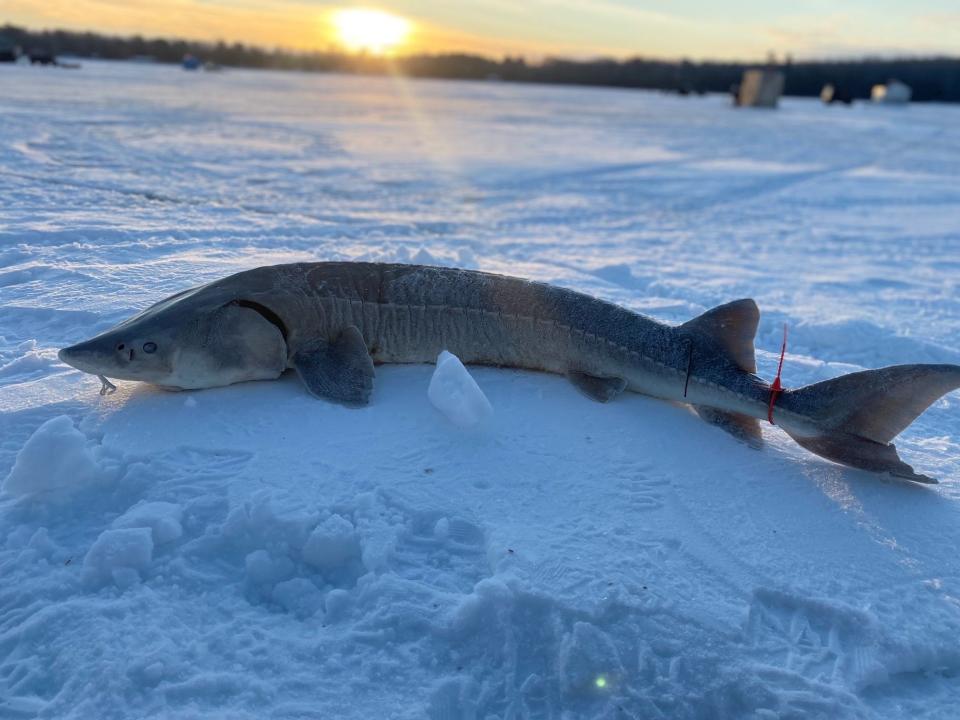DNR cancels Black Lake sturgeon fishing season in Michigan
Michigan's shortest fishing season has been canceled this year for the first time ever.
The 2024 lake sturgeon fishing season on Black Lake in Cheboygan and Presque Isle counties was scheduled to begin at 8 a.m. Saturday and end when the quota of six sturgeon was reached.
However, marginal ice conditions and depletion of ice on Black Lake there caused concern about excessive harvest and inability to effectively track harvests with limited Michigan Department of Natural Resources personnel on the ice, according to the agency, which announced the cancellation Friday.
Part 411 of the Natural Resources and Environmental Protection Acts gives the DNR the authority to cancel the season.
"In addition to protecting the lake sturgeon population, the safety of anglers and staff is critically important," Randy Claramunt, DNR Fisheries chief, said in a news release. "We encourage all anglers across Michigan to use extreme caution while on the ice as we have been experiencing above average temperatures."
It's the first time the sturgeon season has been canceled, according to Neal Godby of the DNR.

Poor ice conditions on Black Lake
Black Lake's ice thickness has been a concern for some time. Days before the season was scheduled to open, the Black Lake chapter of Sturgeon For Tomorrow, a nonprofit that helps with sturgeon rehabilitation, warned anglers to stay off the ice.
The Cheboygan County Sheriff's Department also warned of thin ice on the inland lake on Jan. 25.
"With the ice conditions as they are I am concerned with machinery and heavy sturgeon ice shacks sitting on the ice especially when two, three or four people are in them, all in a small concentrated area," Cheboygan County Sheriff Timothy C. Cook said in a Facebook post.
More: No-snow December followed by rainiest January on record
Black Lake sturgeon fishing season
During a normal fishing season, Black Lake anglers are allowed to harvest one lake sturgeon and have to report the catch immediately to DNR personnel on the ice.
This year, the season would have closed after the sixth fish was harvested or five fish had been harvested at the end of any fishing day. If neither scenario had been met, the season would have closed at 2 p.m. Feb. 7.
Anglers are notified via text message and on the ice by DNR when the season is over. They also get text messages each time a fish is taken by an angler.
The season includes spearing and hook-and-line fishing.
There's no size limit for the lake sturgeon caught.
Last year, the season lasted 65 minutes and the largest fish caught was a 55.5-inch female that weighed 35.5 pounds.
In 2022, the season only lasted 36 minutes.
Black Lake Sturgeon Shivaree still on
Even without a fishing season, the sturgeon party will go on. The annual Black Lake Sturgeon Shivaree will still take place Friday and Saturday, the Black Lake Chapter of Sturgeon for Tomorrow, which hosts the event, confirmed on Facebook.
The event includes live music, poker run, raffle and activities for kids at the former Black Lake Hotel located at 1701 Winifred St. in Cheboygan.
The event will now be held on the shore and the ice fishing contest has been canceled due to poor ice conditions.
There's a $5 entrance fee for the event.
History of lake sturgeon in Black Lake
Lake sturgeon are one of the oldest species in the Great Lakes.
The DNR and several entities have been working to rehabilitate lake sturgeon populations in Michigan after they declined dramatically since the 1800s due to habitat loss and degradation and overfishing, according to the DNR.
Michigan prohibited the taking of lake sturgeon statewide in 1928, according to a 2016 management plan for lake sturgeon in Black Lake.
Beginning in 1948, a limited sport fishery for lake sturgeon was allowed on inland lakes open to spearing, which included Black Lake. Anglers were allowed to harvest two sturgeon of at least 36 inches in length during a two-month season that took place in January and February. The minimum length changed to 42 inches in 1952.
In the late 1990s, there were concerns about an apparent decline in the species' population in Black Lake after declining harvest.
Highly restrictive lake sturgeon harvest regulations were placed on Black Lake in 2000. From 2000 to 2009, the fishing season was capped at either nine days or until a five-fish quota was met. The minimum fish size was set at 36 inches and only a limited number of anglers could participate.
In 2010, the number of anglers allowed to participate became unlimited and the season was set at five days or until the state harvest quota was met. The size limit for harvested fish was also removed to help reduce the harvest of mature females. Participation has ranged from 197-330 anglers since the 2010 rule changes.
However, in 2011, four fish over the state limit were harvested and safeguards were put in place to ensure the quota was not surpassed.
Rehabilitation efforts are working, according to the DNR. The population has increased in the past 20 years due to lake sturgeon rearing and stocking efforts, research and protection of spawning adults.
This article originally appeared on Detroit Free Press: DNR cancels 2024 Black Lake sturgeon fishing season for ice conditions

